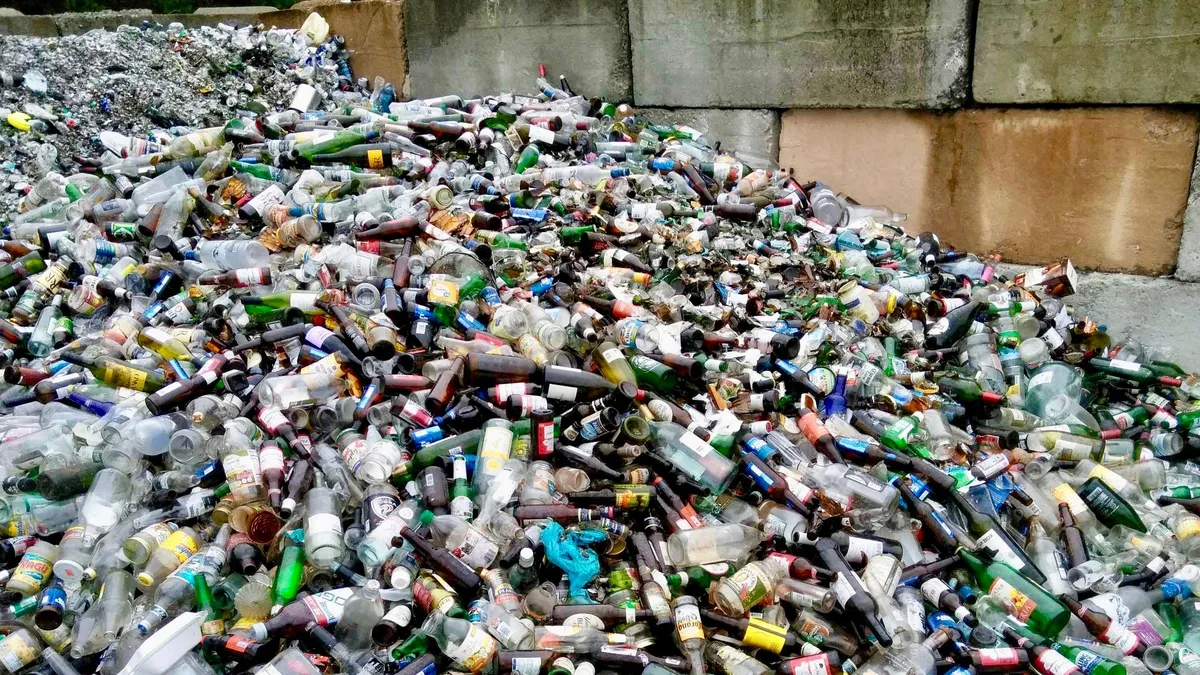Dive Brief:
- Strategic Materials, which describes itself as the largest glass recycler in North America, has filed for Chapter 11 bankruptcy, citing high interest rates, increased competition and changing consumer demands for certain glass packaging and products.
- SMI’s existing lenders plan to provide $23 million to support its business operations as it restructures, and the company says the bankruptcy process will not affect its regular business operations or staff. Its Canada and Mexico-based affiliates are not part of the process.
- The restructuring plan calls for the company to be handed over to certain creditors while it goes through a financial restructuring and reorganization that will include deleveraging its balance sheet by over $300 million, SMI said in a news release Monday.
Dive Insight:
SMI is seen as a well-established glass recycler in North America that has been around for more than 125 years, with about 87% of its revenue coming from business with customers it has worked with for more than 20 years, according to court documents. Recent economic and market headwinds have taken a toll on the company, creating “significant operational and financial challenges,” said CEO Chris Dods in a statement.
SMI will continue meeting its obligations to customers and suppliers, it said in the statement. "We play a critical role for the customers and communities we serve," Dods said. “We are grateful for the demonstration of confidence in our underlying business, represented by substantial new financing committed from the lender group."
SMI’s 568 full-time and about 90 temporary workers that work for companies under the Chapter 11 process will continue to receive pay and benefits, SMI said. One of those companies named in the filings is Missouri-based Ripple Glass, which SMI acquired in 2022. SMI has 43 facilities across the U.S., Mexico and Canada.
SMI is backed by private equity firm Littlejohn & Co. note since 2017 It has about $432 million of funded debt liabilities, which includes about $406 million in outstanding principal and letters of credit, as well as about $25 million in accrued and unpaid interest, according to court documents.
SMI said the Federal Reserve’s decision to fight inflation by raising interest rates significantly over the past two years has caused SMI’s funded debt to “become significantly more expensive and has squeezed the Company’s liquidity.”
SMI says it recycles more than 2 million tons of glass per year and serves “large and stable end markets,” including glass packaging, fiberglass insulation, highway safety beads and recycled plastic resin, according to court documents.
SMI also earned about $500,000 in additional revenue in 2022 from the sale of aluminum, steel, cardboard and other recyclables it recovered while sorting glass in its secondary sorting processes.
However, increased competition and stricter requirements for cullet specifications have pressured company operations, SMI said. In 2019, one of its biggest suppliers in California built its own glass recycling plant, which cut off about 100,000 tons of glass supply SMI had previously relied on. More recently, another of SMI’s customers in Northern California entered the glass recycling market, diverting another 120,000 tons. “Both cases resulted in a ‘price war’ that increased glass supply costs to maintain capacity,” SMI said in court documents.
As more bottle redemption centers continued to close in California, contamination in glass streams rose, increasing operational costs for disposal, it added.
Changes in container manufacturing and consumer habits in the years since the COVID-19 pandemic put further pressure on the company and the glass recycling market as a whole, SMI added. “There has been a general reduction in the use of, and demand for, glass products,” the company said. At the same time, consumers are recycling less glass than in previous years, it said. “This trend appears poised to continue as glass products are increasingly being replaced by plastic counterparts and/or aluminum cans.”
SMI also reported a slow recovery from other COVID-19 trends. Restaurants and bars are “historically bulk recyclers,” but SMI reported collecting lower volumes of bottles from those sites in 2022 and 2023 than it had expected, and “it is uncertain whether it will reverse to pre-pandemic levels in the future.”
SMI estimates its fiscal year 2024 revenue could be about $322.9 million, with net income an estimated $1.67 million.
SMI declined to comment further on the bankruptcy process and directed questions about the case to its public statement and to a public website administered by Kroll, its claims agent. SMI’s next court hearing is on Jan. 10.











